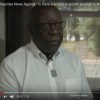KJIPUKTUK (Halifax) – When disasters happen, be they gun violence, school bus accidents, buildings collapsing, or anything that results in tragic loss of life in a community, it is necessary to call in counsellors (crisis response workers) to console and comfort those directly affected based on the betterment of their mental health.
Where each ethnicity has its’ own unique history, traditions and coping mechanisms, it is only logical to bring in African Nova Scotian professionals when tragedies directly affect the African Nova Scotian community.
Calling on such African Nova Scotian expertise greatly reduces the barriers that might hinder open emotional dialogue and therefore the healing process.
African Nova Scotian professionals and lay counsellors have unique ways of directly affecting and enhancing the healing process when tragedies occur.
As counsellors, we understand and are sensitive to the inner workings of our community. Based on the historical pressures heaped on our psyche and our community, non African Nova Scotians, although some are well meaning and with good intent, cannot possibly understand “Post Traumatic Slavery Disorder (PTSD).”
Equally, non African Nova Scotians might not be able to understand oppression, racism , hate and how its past and present are a part of our daily reality.
Afrocentric mental health is never a subject that is studied when one is becoming a counsellor, therapist, psychologist, psychiatrist, etc. This number one fact greatly supports the urgent need for African Nova Scotian professionals and the need for African Nova Scotian tax dollars to be paying them.
African Nova Scotian history has never been seriously discussed in the therapeutic process and therefore has denied African Nova Scotians an understanding of our identity. Counsellors must be aware that the effects of slavery, racism, hate and marginalization are still a part of who we are as a people.
Where mental slavery, racism, hate and marginalization still exist, only those with the knowledge of the associated pain and suffering can truly identify and understand.
One of the most important relationship builders in counselling is trust, but how is trust possible if there is suspicion based on historical degradation, injustice, and demeaning?
In the African Nova Scotian community the stigma of mental illness is rooted in the portrayal of a people as retarded, as field animals, learning disabled, etc.
Historically, African Nova Scotians would seek relief with the help of clergy, family, elders and of late doctors. Going to see a counsellor seemed out of the question, especially where they did not see themselves in the picture.
Understanding cultural issues in counselling is so important and includes an understanding and respect for the views and wishes of family, as well as Involvement of family members in the process. Cultural perspectives can shape people’s reaction to a traumatic experience.
Specifically, culture influences:
- What type of threat is perceived as traumatic;
- How individuals and communities interpret the meaning of a traumatic event and how they express their reactions to the event, etc.;
- What is seen as an appropriate response for African Nova Scotians
The Nova Scotia government must protect African Nova Scotian counsellors and therapists We, like many others, have found our calling in helping others – it’s truly a selfless profession. From family counsellors to school counsellors and all in between, counselling and administering therapy have great rewards of affecting positive change.
Unfortunately, it also holds great liabilities.
Despite our best intentions and no matter how objective we are in our counselling, we must be prepared to face the unexpected. Claims can be filed against African Nova Scotian counsellors, for all sorts of reasons. In reality due to racism and an unfair system of limitation, economic and otherwise, African Nova Scotian counsellors face a greater risk of being sued and a single claim or allegation whether justified or not, can be devastating.
With this in mind, the Nova Scotia government must provide liability insurance to cover those African Nova Scotians reaching out to assist others in our community.
There exist professional liability insurance designed just for counsellors and therapists that is comprehensive and affordable at a reasonable cost.
Lists of available counsellors, availability and contact information should be made available to all police departments, fire departments, hospitals, schools, etc.
This need is immediate and the government of Nova Scotia has a responsibility to respond ASAP with the same support and consideration it gives other citizens. We all pay taxes!!
See also:
- Raymond Sheppard: African Nova Scotian mental health matters
- Robert Wright: In the Black community carding resonates with a history that is traumatic
With a special thanks to our generous donors who make publication of the Nova Scotia Advocate possible.
Subscribe to the Nova Scotia Advocate weekly digest and never miss an article again.





Thank you Raymond Sheppard, hopefully we get to rehabilitate our lives and began healing in that process to allow us an opportunity to move forward from the mental pain and suffering of racial discrimination we still have to endure every day here in Halifax, Nova Scotia when we leave the safety and security of our homes. We need a new approach to addressing mental health issues, especially within our Black Communities.